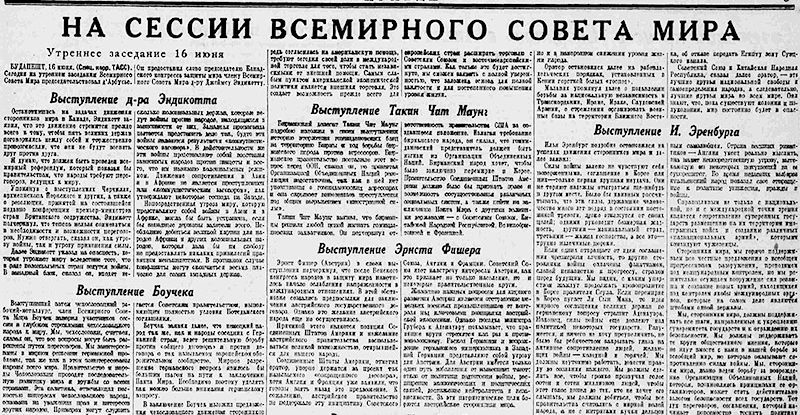Опубликовано: На сессии Всемирного Совета Мира // Правда. 17.06.1953. С. 3.
Читать PDF 0,96Mb
15-20 июня 1953 года в Будапеште проходила сессия Всемирного Совета Мира. В целом, по воспоминаниям участников, сессия проходила в атмосфере больших надежд на победу дела Мира, вызванной прогрессом мирного урегулирования в Корее и наметившейся разрядкой международной напряженности.
Символичным стало, что именно в эти дни в США казнили супругов Розенберг, которые однозначно воспринимались как активные члены движение за Мир.
В рамках сессии совета прозвучали выступления представителе самых разных государств. Так, представитель Канады, доктор Джеймс Эндикотт назвал главной задачей участников движения за мир, сделать так, чтобы пять ведущих держав никогда не воевали между собой. Упомянул он в своей речи и антиколониальные выступления и войны, которые шли в странах Азии и Африки. Причиной их он назвал нежелание бывших колониальных стран действовать в направлении мирного урегулирования.
Представитель ФРГ пастор Нимеллер призвал к достижению понимания между противостоящими странами. «Когда я говорю «мир» и при этом не выражаю желания встретиться и договориться с противной стороной, это значит, что на деле и объективно я не хочу мира и просто злоупотребляю этим словом и обманываю людей, которым оно дает надежду». В качестве примера удачного разрешения противоречий, пастор привел урегулирование церковных вопросов в ГДР, ранее вызывавших беспокойство в среде христиан Германии.
Норвежский посланник, пастор Рагнар Форбекк, рассказал о том, как международная напряженность привела к усилению зависимости Норвегии от США и экономическим затруднениям. Когда речь итог о международном напряжении, отметил Форбекк, следует понимать, что эти напряжение существует не между народами, не между простыми людьми Востока и Запада: напряжение существует между правительствами, но в какой-то мере и некоторые народы стали жертвой пропаганды, утверждавшей, что напряжение существует между народами.
Индийский представитель, член партии Индийский национальный конгресс Чатур Нараин Малавия, указал на важность для укрепления мира развития антиколониального движения. «Пока существуют колонии и полуколонии мир всегда будет в опасности», заявил он.
Советский Союз на этой сессии представлял Илья Эренбург. В своем выступлении он поздравил участников сессии и все «прогрессивное человечество» с успехами в деле продвижения борьбы за мир, однако предостерег от излишнего оптимизма. «Силы войны далеко не чувствуют себя побежденными, и соглашение в Корее для них — только первая крупная неудача. Они не теряют надежды отыграться каким-нибудь другим способом. Было бы наивным рассчитывать, что эти силы, державшие человечество много лет подряд в состоянии постоянной тревоги, легко откажутся от своих целей; одними руководит безмерная жадность, другими — маниакальный страх, третьими — жажда господства, а все это— трудно излечимые пороки», сказал он.
Также совеский представитель поддержал идеи всеобщего разоружении, призвал к мирному и справедливому объединению Германии и поддержал антиколониальную борьбу народов Азии и Африки.
Pravda newspaper, June 21, 1953
On June 15-20, 1953, a session of the World Peace Council was held in Budapest. In general, according to the recollections of the participants, the session was held in an atmosphere of great hopes for the victory of Peace, caused by the progress of a peaceful settlement in Korea and the emerging relaxation of international tension.
It became symbolic that it was on these days in the United States that the Rosenberg spouses, who were unambiguously perceived as active members of the peace movement, were executed.
During the session of the Council, speeches were made by representatives of various states. So, the representative of Canada, Dr. James Endicott called the main task of the participants in the movement for peace, to make sure the five leading powers never fight among themselves. He also mentioned in his speech the anti-colonial actions and wars that were going on in the countries of Asia and Africa. The reason for them, he called the reluctance of the former colonial countries to act towards a peaceful settlement.
The Federal Republic of Germany (FRG) representative, Pastor Niemeller, called for an understanding between the opposing countries. «When I say ‘peace’ and at the same time do not express a desire to meet and agree with the opposing side, it means that in fact and objectively I do not want peace and simply abuse this word and deceive people whom it gives hope». As an example of a successful resolution of any contradictions, the pastor cited the settlement of church issues in the German Democratic Republic (GDR), which had previously caused concern among Christians in Germany.
The Norwegian envoy, Pastor Ragnar Vorbekk, told how international tensions have led to Norway’s increased dependence on the United States and economic hardship. When talking about the outcome of international tension, Vorbeck noted, it should be understood that these tensions do not exist between peoples, not between ordinary people of the East and West: there is tension between governments, but to some extent, some peoples have become victims of propaganda, claiming tension exists between nations.
The Indian representative, member of the Indian National Congress Party Chatur Narain Malawia, pointed out the importance of the development of the anti-colonial movement for strengthening the world. “As long as colonies and semi-colonies exist, the world will always be in danger”, he said.
The Soviet Union was represented by Ilya Ehrenburg at this session. In his speech, he congratulated the session participants and all the «progressive humanity» on their successes in promoting the struggle for peace, but warned against excessive optimism as well.
“The forces of war are far from being defeated, and the agreement in Korea is only the first major setback for them. They do not lose hope of recouping in some other way. It would be naive to expect that these forces, which have kept humanity in a state of constant anxiety for many years in a row, will easily abandon their goals; some are ruled by immense greed, others by manic fear, and still others by a thirst for domination and all of these are difficult-to-treat vices”, he said. Also, the Soviet representative supported the idea of general disarmament, called for a peaceful and just unification of Germany and supported the anti-colonial struggle of the people of Asia and Africa.

